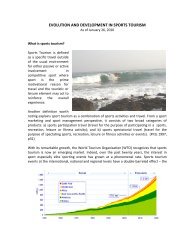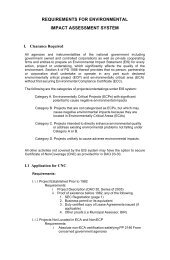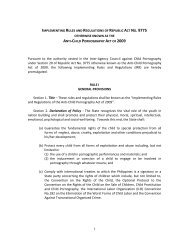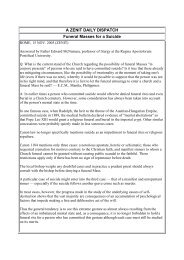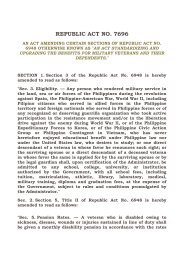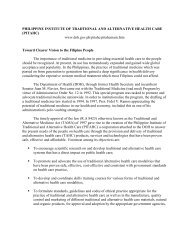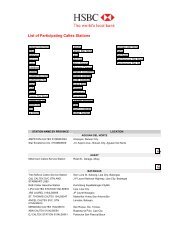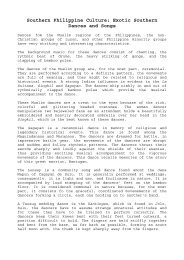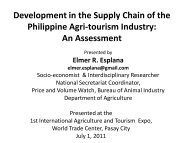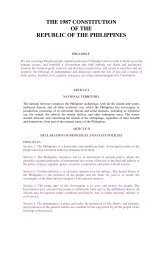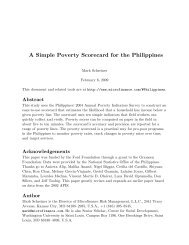Mining in the Philippines - Concerns and Conflicts
Mining in the Philippines - Concerns and Conflicts
Mining in the Philippines - Concerns and Conflicts
You also want an ePaper? Increase the reach of your titles
YUMPU automatically turns print PDFs into web optimized ePapers that Google loves.
which requires that consent be obta<strong>in</strong>ed ‘<strong>in</strong> accordance with <strong>the</strong> customary laws <strong>and</strong> practices’ <strong>and</strong><br />
‘free from any external manipulation’.<br />
Cases similar to those recounted to <strong>the</strong> FFT, where m<strong>in</strong><strong>in</strong>g companies eng<strong>in</strong>eered consent, have been<br />
documented all over <strong>the</strong> country. 77<br />
3.5.1. Lack of <strong>in</strong>dependent monitor<strong>in</strong>g & expertise provision & <strong>the</strong> NCIP<br />
The National Commission on Indigenous Peoples (NCIP) is <strong>the</strong> body m<strong>and</strong>ated to ‘protect <strong>and</strong><br />
promote <strong>the</strong> <strong>in</strong>terest <strong>and</strong> well-be<strong>in</strong>g of <strong>the</strong> ICCs/IPs’. It is responsible for ensur<strong>in</strong>g adherence to <strong>the</strong><br />
implement<strong>in</strong>g rules <strong>and</strong> regulations of <strong>the</strong> IPRA. The perception among <strong>in</strong>digenous peoples, based on<br />
<strong>the</strong>ir experience of <strong>the</strong> FPIC process to date, is that <strong>the</strong> NCIP is fail<strong>in</strong>g <strong>in</strong> its m<strong>and</strong>ate <strong>and</strong> has <strong>in</strong> many<br />
cases sided with m<strong>in</strong><strong>in</strong>g companies. Some blame this on a lack of fund<strong>in</strong>g for <strong>the</strong> NCIP, o<strong>the</strong>rs on its<br />
lack of <strong>in</strong>dependence from a political agenda that is strongly pro-m<strong>in</strong><strong>in</strong>g; o<strong>the</strong>rs still attribute it to<br />
corruption <strong>and</strong> bribes by m<strong>in</strong><strong>in</strong>g companies.<br />
Given this perception of <strong>the</strong> NCIP’s bias aga<strong>in</strong>st <strong>in</strong>digenous peoples, <strong>the</strong>re is a need to address its lack<br />
of credibility <strong>and</strong> restore confidence <strong>in</strong> legal processes. This might take <strong>the</strong> form of a credible<br />
<strong>in</strong>dependent body to certify that consent has been given <strong>in</strong> l<strong>in</strong>e with <strong>the</strong> IPRA’s legal guidel<strong>in</strong>es. The<br />
Philipp<strong>in</strong>e Commission on Human Rights may be able to play an important role <strong>in</strong> certify<strong>in</strong>g<br />
<strong>in</strong>digenous peoples’ consent. Where methods used to obta<strong>in</strong> consent breach <strong>the</strong> IPRA guidel<strong>in</strong>es,<br />
legal remedies should be accessible to <strong>the</strong> affected communities. It should be noted that communities<br />
repeat <strong>the</strong>ir concern that <strong>the</strong> f<strong>in</strong>ances <strong>and</strong> expertise available to companies <strong>and</strong> <strong>the</strong> <strong>in</strong>ability of<br />
communities to ‘afford’ <strong>the</strong> lawyers <strong>and</strong> costs of access to justice, is a significant barrier to just<br />
outcomes. The team believes that given <strong>the</strong> scale of <strong>the</strong> violations, <strong>the</strong> office of <strong>the</strong> Ombudsman<br />
should be streng<strong>the</strong>ned to deal with violations of <strong>in</strong>digenous peoples’ rights. The model implemented<br />
<strong>in</strong> Venezuela, of a post of Special Ombudsman on Indigenous Issues, should be considered. A<br />
credible selection process <strong>and</strong> <strong>the</strong> employment of staff sympa<strong>the</strong>tic to, <strong>and</strong> knowledgeable about,<br />
<strong>in</strong>digenous cultures is essential for this office to be credible <strong>in</strong> <strong>the</strong> eyes of <strong>in</strong>digenous peoples.<br />
There is also a need to m<strong>and</strong>ate an <strong>in</strong>dependent body to provide scientific <strong>and</strong> legal assistance to<br />
<strong>in</strong>digenous peoples dur<strong>in</strong>g <strong>the</strong> FPIC process. Such a body is essential to ensure that <strong>in</strong>digenous<br />
peoples are <strong>in</strong> a position to consider giv<strong>in</strong>g <strong>the</strong>ir <strong>in</strong>formed consent. There is a need to provide<br />
<strong>in</strong>dependent assessments <strong>and</strong> explanations of ESIAs. This <strong>and</strong> o<strong>the</strong>r <strong>in</strong>formation should be provided<br />
as part of <strong>the</strong> FPIC process <strong>in</strong> a language <strong>and</strong> format underst<strong>and</strong>able by <strong>in</strong>digenous peoples, to<br />
ensure that <strong>the</strong>y are fully <strong>in</strong>formed of <strong>the</strong> potential impacts. 78<br />
3.5.2. Weaknesses <strong>in</strong> <strong>the</strong> Law<br />
There are a number of weaknesses <strong>in</strong> <strong>the</strong> current IPRA legislation <strong>and</strong> its Implement<strong>in</strong>g Rules <strong>and</strong><br />
Regulations (IRR), as currently revised, <strong>in</strong> relation to FPIC. Two major problems are:<br />
• <strong>the</strong> short timeframe allotted for consensus build<strong>in</strong>g <strong>in</strong> <strong>the</strong> Implement<strong>in</strong>g Rules <strong>and</strong><br />
Regulations;<br />
• <strong>the</strong> current <strong>in</strong>terpretation of Section 56 of <strong>the</strong> IPRA which seeks to deny <strong>in</strong>digenous peoples<br />
<strong>the</strong> right to FPIC for m<strong>in</strong><strong>in</strong>g operations that existed before <strong>the</strong> enactment of <strong>the</strong> IPRA.<br />
The government, <strong>in</strong> <strong>the</strong> <strong>in</strong>terest of speed<strong>in</strong>g up permit applications <strong>and</strong> with <strong>the</strong> approval of <strong>the</strong><br />
NCIP, has implemented new guidel<strong>in</strong>es for <strong>the</strong> FPIC process. Ra<strong>the</strong>r than address<strong>in</strong>g exist<strong>in</strong>g<br />
concerns, <strong>the</strong>y focus on speed<strong>in</strong>g up <strong>the</strong> FPIC process <strong>and</strong> may even reduce protections that currently<br />
exist.<br />
14




